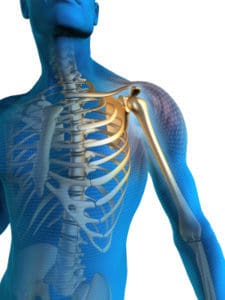Hyattsville physical therapists can guide you through all stages of treatment for frozen shoulder

October 12, 2016
The shoulder is the most mobile joint in the body, and we use it very frequently in many everyday movements and tasks. For this reason, when any type of issue occurs with the shoulder, it can severely affect our ability to function normally. There are a number of problems that can develop within the shoulder, but one of the most bothersome is called frozen shoulder. This condition lasts for a long while through several phases, but our Hyattsville physical therapists can treat it throughout its entirety.
The shoulder is a ball-and-socket joint, with the upper arm bone (humerus) serving as the “ball” and fitting into the “socket” of the shoulder blade (scapula). The bones and other structures of the shoulder are surrounded by a structure called the shoulder capsule, which is made up of strong connective tissue that helps to keep the shoulder stable. Adhesive capsulitis, or frozen shoulder, occurs when scar tissue forms within the shoulder. This causes the shoulder capsule to thicken and tighten around the shoulder joint, which means there is less room to move the shoulder normally.
Although frozen shoulder affects up to 5% of the population, it’s not entirely clear why it develops. In general, it’s believed that not moving the shoulder joint normally for a long period of time is one of the leading factors, as most people who get frozen shoulder have kept their shoulder from moving due to a recent injury, surgery, pain or some other condition. People between the ages of 40-60, women and those with arthritis, diabetes, cardiovascular disease and other health conditions are also more likely to develop it.
Frozen shoulder usually develops slowly and gets progressively worse with more pain and loss of motion over time. This is typically broken down into the following stages:
- Stage 1 (pre-freezing): symptoms start at this stage and gradually get worse over the course of 1-3 months; there is usually an ache over the outer shoulder that will make it more difficult to move and rotate the shoulder
- Stage 2 (freezing): generally occurs 3-9 months after the start of symptoms; any movement of the shoulder causes pain, which is even worse at night
- Stage 3 (frozen): occurs within 9-14 months; the shoulder becomes more stiff, making it more difficult to move and rotate it; pain will gradually level off or start to decrease by the end of it
- Stage 4 (thawing): occurs within 12-15 months; pain decreases significantly, especially at night, range of motion begins to improve, making it easier to move
How Hyattsville physical therapists can effectively treat frozen shoulder
There are a number of treatment options available for frozen shoulder, but physical therapy is commonly recommended because it’s known to be effective for addressing symptoms at each of its stages. The goal of physical therapy is to control pain and improve strength and flexibility to help patients move their shoulder more easily, and our Hyattsville physical therapists treat it depending on the stage with the following:
- Stages 1 & 2: the focus at this point will be to reduce pain and preserve the movement of your shoulder; treatments usually include stretching exercises, manual therapy, heat and/or ice and a home-exercise program
- Stage 3: this stage of treatment will focus on helping you start to regain your normal range of motion, with stretching exercises and manual therapy continuing but becoming more aggressive; strengthening exercises may also be added
- Stage 4: this stage focuses on helping you return to your normal daily activities, and stretching exercises, strengthening exercises and manual therapy will all continue to progress and become more intense; specific training for activities and sports will also be incorporated at this point
Treating frozen shoulder can be a long and drawn-out process, but our Hyattsville physical therapists are here to assist you every step of the way. If you’re dealing with frozen shoulder or any other conditions that are preventing you from living the life that you’d like to live, contact CAM Physical Therapy and Wellness Services, in Laurel, Hyattsville, Glenn Dale/Bowie and Parkville/Baltimore, MD at 301-853-0093 to schedule an appointment today, or click here for more information on frozen shoulder.